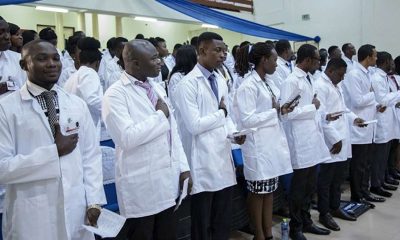Education
Strike: No end in sight, state varsities insist

Some branches of the Academic Staff Union of Universities in state-owned universities have vowed to remain on strike following the failure of the Federal Government to successfully negotiate with the national body of the union.
Chairpersons of ASUU in the affected state universities, who spoke in separate interviews with our correspondents, described as “ignorant” calls for the suspension of the strike in state-owned universities.
The PUNCH reports that the national body of ASUU had on Monday, February 14, 2022 declared a national strike, thereby grounding academic activities in federal universities and some state-owned universities across the country.
The national body had requested from the Federal Government the release of revitalisation funds to universities; earned allowances; deployment of the University Transparency Accountability System for the payment of salaries and allowances of lecturers; release of the white paper on the visitation panels to universities among others.
Although some state universities like the Kwara State University, Lagos State University, Osun State University, Kaduna State University among others pulled out of the strike, findings by our correspondents, however, revealed that majority of state-owned universities remain on strike.
READ ALSO:
- ‘Adesanya ready to make heavyweight move’
- Director of FG Agency dies during fight inside office with female employee
- Nigerians qualify as UK launches scale-up visa for skilled workers
Such universities include Ekiti State University; Gombe State University; Olabisi Onabanjo University and Tai-Solarin University of Education, Ogun State; Ladoke Akintola University of Technology, Oyo state; Adekunle Ajasin University, Ondo State; Bauchi State University; Benue State University, Ibrahim Babaginda University, Niger; Yusuf Maitama Sule University, Kano; Imo State University; Nasarawa State University; Abia State University; Kano State University of Technology; Kebbi State University; and Sokoto State University among others.
Benue State University
The University’s ASUU chairman, Dr Tarnongu Kwaghfan, insisted that the university would not resume class until the national secretariat of the union gives the directive.
He said, “Benue State University is on strike, it is not a sympathy strike because the university is a member of National Executive Council of ASUU and member of National Delegate Conference of ASUU. So we are part of the decision-making process of the union. Those saying we are on sympathy strike are saying that out of ignorance.”
Asked what would happen if the union and Federal Government reached an agreement but not implementable by the states, the ASUU chairman of BSU said whatever agreement the Federal Government and the union agreed on must be implemented by the states.
Adekunle Ajasin University
The University’s ASUU chairman, Prof Simon Ehiabhi, said, “ In ASUU, there is no federal or state ASUU. ASUU is just a single entity with chapters. What you have are branches of ASUU, and state universities that have subscribed to ASUU are branches of ASUU. Just as you have one Nigeria Union of Teachers. You don’t have federal or state NUT. Just as you have one Joint Admissions and Matriculation Board that conducts UTME, you don’t have federal or state JAMB. Just as you have one NECO, one WAEC, that’s how ASUU is.
“So if anybody is calling for state universities to pull out of the strike or not to join the strike, the person is speaking out of ignorance or out of not really understanding how the union operates. So no branch of the union can pull out of the strike, decided by all the branches at the congress.”
TASUED, Ogun State
The branch’s ASUU chairman, Dr Rufai Kazeem, said, “For now, my university, TASUED, we are on strike and will not opt out of the strike until all our demands are met,” he said.
Kano varsity
The ASUU branch of the Kano University of Science and Technology, Wudil, in a statement jointly signed by the Chairman, Muhammad Gaya and Secretary, Murtala Muhammad, and made available to newsmen on Wednesday.
“The union noted that the body language and antics of the government are indications that the government was out to completely destroy education in the country, especially tertiary education.”
‘Shift grounds’
Meanwhile, the Muslim Media Watch Group of Nigeria has urged the Federal Government and ASUU to shift grounds in order to pave the way for amicable resolution of the prolonged strike.
The Executive Director of MMWG, Alhaji Ibrahim Abdullahi, in a statement in Ilorin, Kwara State on Tuesday stressed the need for the parties involved in the crisis to shift grounds in view of the damage the prolonged strike has done to the university education system.
Ekiti varsity’s resumption
The management of Ekiti State University, Ado Ekiti on Wednesday directed all newly-admitted students for 2021/2022 academic session to resume on Monday for screening, registration and orientation programme.
The order, despite the ongoing ASUU strike, followed the advisory by stakeholders in the institution to the management to reopen the university without further delay for continuation of academic activities.
EKSU Registrar, Ife Oluwole, announced the resumption in a statement in Ado Ekiti titled, ‘Resumption of academic and administrative activities in the university: University stakeholders’ resolutions.’
Oluwole stated that the stakeholders expressed worries that the industrial action was having negative effects not only on the students, but also on the university in areas including “undue prolongation of the academic calendar and the stay of the students on campus”
The PUNCH reports that the strike by ASUU entered its 191st day today (Thursday).
Education
FG says colleges of education will begin awarding degrees in September

FG says colleges of education will begin awarding degrees in September
Minister of Education, Tunji Alausa, says a dual mandate allowing colleges of education (COEs) to award both bachelor’s degrees and the National Certificate in Education (NCE) is for implementation this September.
In 2023, the mandate was signed into law, having undergone ideation with numerous committees recommending its adoption.
It was to take effect from the 2024/2025 academic session (starting September 2024), where only federal COEs aged at least 10 years were to pilot the programme.
Alausa spoke in Abuja during a follow-up meeting on resolutions from the last biannual stakeholders meeting.
He said the implementation of the dual mandate will now begin in September 2025.
The education minister said it would boost enrolment in COEs and eliminate the need to convert COEs to universities.
Alausa said reforms within COEs are important for adapting to modern demands and technological advancements.
He urged educators to integrate technology, critical thinking, and computational skills into their curricula.
“We once had a strong educational system, and that’s what we are working hard to restore. All hands are on deck to achieve this,” he said.
“We must tackle the high number of out-of-school children and reduce learning poverty across the country. As teachers, you are at the centre of driving this change, and you must also challenge yourselves.
“The way we taught 30 or 50 years ago is no longer relevant. Education and teaching methods are evolving. You must start thinking about how to use technology in the classroom.”
Alausa stressed the need for educators to harness educational technology and artificial intelligence to improve teaching and learning outcomes.
Addressing declining enrolment in colleges of education, he urged administrators and staff to support the ongoing reforms, warning that the survival of their institutions depends on their ability to adapt.
“With this dual mandate, there is no need for conversion to university status. You should be the ones pushing for implementation, not the other way around. It’s a matter of your survival,” he said.
“The government has secured the future of colleges of education. It is now up to you to sustain them. Failure to embrace this mandate could lead to extinction.
“With this reform, there’s no justification for any college of education to seek university status.”
Education
Kano governor gives secondary students 10,000 free JAMB forms

Kano governor gives secondary students 10,000 free JAMB forms
The Governor of Kano State, Alhaji Abba Kabir Yusuf, has inaugurated the distribution of 10,000 free JAMB forms to Kano secondary school students.
During the flag-off of the distribution, the Governor, who was represented by the state’s Commissioner of Education, Ali Haruna Makoda, also used the opportunity to inaugurate the training of the 10,000 beneficiaries on the use of computer-based tests at various designated centers across Kano State.
On his part, the Governor’s Special Adviser on Education, Alhaji Tajuddin Gambo, said the Governor has promised to provide transport for the beneficiaries throughout the training session and urged them to ensure they pass the examination.
He said the government is willing to select the best schools for the beneficiaries if they pass the examinations.
One of the beneficiaries of the 10,000 free JAMB forms, Fatima Mukhtar Umar, expressed gratitude to Governor Abba Kabir Yusuf for issuing the free JAMB forms and promised not to disappoint.
READ ALSO:
- N10m raised to relocate boy who faced Peter Obi convoy — Lawyer
- Delta Governor’s aide, Shimite, dies on Easter Monday
- 4 killed, 8 injured in Gombe Easter Monday road accident
In a statement by Governor Abba Kabir Yusuf’s Special Adviser on Information, Ibrahim Adam, it was noted that the Governor used the opportunity to elaborate on the feats achieved by his government in developing the education sector in the last 22 months. These include the re-introduction of foreign and domestic scholarships, re-opening of 21 skills acquisition institutes, general renovation of primary and secondary schools, construction of new classrooms, provision of classroom furniture and writing materials, and the distribution of free uniforms to primary school pupils.
Other achievements, according to the Governor’s Special Adviser on Information, Ibrahim Adam, include the reduction of 50% of registration fees in state-owned tertiary institutions, cash conditional transfers to support girl-child education, and the settlement of registration fees for NECO, NABTEB, and NBAIS, to mention but a few.
Ibrahim Adam said Governor Abba Kabir Yusuf urged all the beneficiary students to make the best use of the opportunity and strive for excellence in their academic pursuits, saying that the future belongs to those who work tirelessly to turn dreams into realities.
Kano governor gives secondary students 10,000 free JAMB forms
Education
WAEC unveils portal for past WASSCE questions

WAEC unveils portal for past WASSCE questions
The West African Examinations Council, WAEC, has announced four significant innovations for the upcoming 2025 West African Senior School Certificate Examination, WASSCE. One of such is a portal to access past questions.
The notable change introduces a unique question set for each candidate, alongside a transition to a computer-based examination format.
Dr. Amos Dangut, the Nigeria National Office Head of WAEC, expressed enthusiasm about these innovations, stating, “In our continuous effort to enhance the educational experience and improve student outcomes, WAEC is excited to announce the introduction of an innovative e-learning portal and an e-study portal, along with the availability of past examination questions.”
One of the key innovations includes the addition of past questions, which will now be accessible online.
This resource is designed to help candidates prepare effectively by familiarizing them with the exam format and question styles.
“By practicing with these questions, candidates can identify their strengths and areas that require improvement, leading to better performance in the examination,” Dr. Dangut explained.
The E-Learning Portal is another significant development. This platform will offer a comprehensive suite of educational materials, including video tutorials and interactive lessons tailored to the WASSCE curriculum. “By leveraging technology, we aim to create an engaging learning environment that encourages self-paced study, ultimately enhancing the academic readiness of our candidates,” he added.
READ ALSO:
- CBEX: SEC can’t recover lost N1.3trn funds for victims, says DG
- [Updated] 9 rescued as three-storey building collapses in Lagos
- Multiple casualties as truck rams into vehicles on Abuja’s Karu Bridge
Additionally, the newly introduced E-Study Portal will serve as a centralized hub for essential study resources, including study guides and revision tips. It will also facilitate collaboration among students through discussion forums.
“This will allow them to engage with peers and educators for a more enriched learning experience,” Dr. Dangut noted.
-

 International2 days ago
International2 days agoBreaking: Pope Francis dies at 88 – Vatican
-

 metro1 day ago
metro1 day agoBring your children to compete with mine, MC Oluomo challenges those mocking his spoken English
-

 metro2 days ago
metro2 days agoHow Nigerian hotelier died during wife’s 60th birthday celebration
-

 metro23 hours ago
metro23 hours agoRivers: Tinubu meets with Fubara, may lift his suspension
-

 News2 days ago
News2 days agoTinubu returns to Nigeria after France, UK trip
-

 metro2 days ago
metro2 days agoAnsar-Ud-Deen Society of Nigeria elects new leaders, Tinubu praises educational contributions
-

 Business1 day ago
Business1 day agoMarketers count losses as NNPC slashes petrol price
-

 metro2 days ago
metro2 days agoReno Omokri defends Tinubu’s appointments, blasts president’s critics













